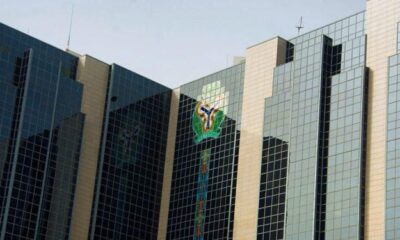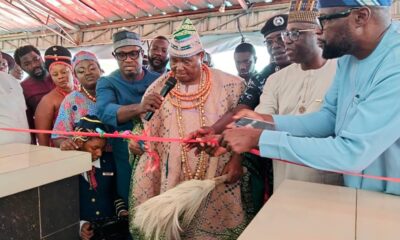Business
Nigeria Economic Society Wants Collaboration With CBN To Reshape Nation’s Economy
Published
2 years agoon
By
Editor
The Nigeria Economic Society (NES) has called for the strengthening of collaboration between the group and the Central Bank of Nigeria (CBN) to support the reshaping of the Nigerian economy to boost growth and development.
The president of NES, Prof. Adeola Adenikinju made the call during a courtesy visit to the Governor of the Central Bank of Nigeria, Dr. Olayemi Cardoso on Tuesday, 14 November.
While lauding some of the policy initiatives of the new Central Bank Governor and his management team, Prof. Adenikinju called for the reconfiguration of the nation’s monetary architecture to align with the uniqueness of the Nigerian economic ecosystem.
“The NES lauds the positions and actions that the CBN has taken in recent times. Your decision that the CBN under your watch would stick to its primary responsibility of monetary and price stability is laudable.
“You have also indicated that there would be compliance with Statutory Laws and Regulations, and that the Bank would invest more in human capacity development.
READ ALSO: CBN Extends Old Naira Notes Validity
“You have also indicated that you would work closely with your fiscal counterparts so as to promote a harmonious monetary and fiscal coordination.
“The steps taken by the CBN towards achieving exchange rate unification, and paying down on FX liabilities are steps in the right direction. Mr. Governor Sir, for us at NES, we are committed to partnering with the CBN to deliver a strong post-Covid 19 and post-oil Nigerian economy.
“In pursuing an effective monetary policy through the market, you should remember Keynes warnings that “When the facts change, I change my mind”.
He warned about the possibility of markets not being moved by reason but some animal spirits, implying that monetary policy should not just surrender to either the market or the government, given the well-known path to the failure of both in achieving optimal resource allocation.
READ ALSO: N100bn CNG Buses: Senate Rejects CBN Loans, Warns Tinubu Against Illegal Spending
“The monetary policy architecture should be configured to fit the uniqueness and urgent imperatives of the Nigerian economic ecosystem to leapfrog it unto a path of sustainable economic growth and development.
“In this onerous national task, the CBN should always count on us as dependable partners ready to give our hand of friendship and needed support when called upon,” he added.
While advocating for new areas of collaboration, the NES President emphasised the need to strengthen economic research and policy reform collaborations between CBN and the NES in line with with global best practices.
“On Collaborative research, we think there are two key areas of need that NES can play an important role in helping the bank deliver on its mandates. First, although the bank has great capacity and resources for research, assessment studies of the effectiveness of bank’s own policies and interventions are best undertaken by independent reputable external entities, in line with international best practices, and are regarded more credible.
READ ALSO: CBN May Lose Control Of The Naira
“Secondly, collaboration with NES can also focus specifically on advocacy, focusing on certain specific issues that the bank may choose from time to time, hence complementing the bank’s policy communication”.
Responding, the Governor of Central Bank of Nigeria, Dr Olayemi Cardoso appreciated the NES Council members for the courtesy visit and lauded their continued policy advocacy in the Nigerian economy.
While promising collaboration with the NES as done by his predecessors, the new CBN Governor assured of his desire to take it a notch further for the mutually beneficial gains for the overall economic development and policy formulation in Nigeria.
He reaffirmed the Banks commitment to stick with the price stability goal of CBN as its overall objective and harped on the need for the NES to continue to train the up-coming economists in the country through well targeted capacity building programmes for an inclusive growth, while also supporting gender-equality.
In attendance were President: Prof. Adeola Adenikinju , Vice Presidents: Prof. Stella Madueme, National Secretary: Dr. Frank I. Ogbeide, Associate Editors: Prof. Mohammed Yelwa; Business Manager: Dr. Idris Mohammed Idris, Publicity Secretary: Dr. Oluwafemi Mathew Adeboje, Ex-Officio: Dr. Rislanudeen Muhammad , Ex NES President —Prof. Sarah Anyanwu
Also present was the host and CBN Governor, Dr Olayemi Cardoso, Dr Muhammad Abdullahi Dattijo, Deputy Governor (Economic Policy), Dr. Hassan Mahmud, Director, Monetary Policy Department and Philip Ndanusa Wondi, the Senior Special Assistant to the Governor.
You may like


753 Duplexes: Abuja Court Admits Emefiele To N2bn Bail


Reps To Quiz Edun, Cardoso Over Non-compliance With Fiscal Responsibility Act


JUST IN: CBN Retains 27.50% Interest Rate Again


Nigeria’s External Reserves Increase As CBN Releases 2024 Financial Results


CBN Opens Up On Introducing New ₦5,000, ₦10,000 Notes


Alleged $6.3m Fraud: Court Defers Trial Of 3 CBN Officials
Business
JUST IN: Dangote Refinery Hikes Petrol Ex-depot Price
Published
2 weeks agoon
June 20, 2025By
Editor
Nigerians may soon pay more for petrol as the Dangote Petroleum Refinery on Friday increased its ex-depot price for Premium Motor Spirit to N880 per litre, raising fresh concerns over fuel affordability and price volatility in the downstream sector.
Checks on petroleumprice.ng, a platform tracking daily product prices, and a Pro Forma Invoice seen by The PUNCH confirmed the hike, representing a N55 increase from the previous rate of N825 per litre.
The increment would ripple across the entire fuel distribution chain, likely pushing pump prices above N900/litre in some parts of the country, especially in areas far from the distribution hubs.
The hike comes despite global crude prices falling. Brent crude dipped by 3.02% to $76.47, WTI fell to $74.93, and Murban dropped to $76.97 on Friday. The decline in benchmarks offers little relief due to persistent fears of sudden supply disruptions.
READ ALSO: JUST IN: Dangote Refinery Sashes Petrol Gantry Price
The refinery has increased its reliance on imported U.S. crude and operational costs amid exchange rate instability, which adds to its pricing pressure.
On Thursday, the President of the Dangote Group, Aliko Dangote, said his 650,000-barrel capacity refinery is “increasingly” relying on the United States for crude oil.
This came as findings showed that the Dangote Petroleum Refinery is projected to import a total of 17.65 million barrels of crude oil between April and July 2025, beginning with about 3.65 million barrels already delivered in the past two months, amid ongoing allocations under the Federal Government’s naira-for-crude policy.
Dangote informed the Technical Committee of the One-Stop Shop for the sale of crude and refined products in naira initiative that the refinery was still battling crude shortages, which had led it to resort to imports from the United States.
READ ALSO:Dangote Stops Petrol Sale In Naira, Gives Condition For Resumption
On Monday, the president of the Petroleum and Natural Gas Senior Staff Association of Nigeria, Festus Osifo, accused oil marketers of exploiting Nigerians through inflated petrol prices, insisting that the current pump price of PMS should range between N700 and N750 per litre.
He criticised the disparity between falling global crude oil prices and the stagnant retail price of petrol in Nigeria.
“If you go online and check the PLAT cost per cubic metre of PMS, convert that to litres and then to our Naira, you will see that with crude at around $60 per barrel, petrol should be retailing between N700 and N750 per litre.”
He asserted that if Nigerians bear the brunt of higher fuel costs, they should be allowed to enjoy the benefit of low pricing.
His forecast of increased costs now appears spot on, considering the latest developments.
Marketers are already adjusting. Depot owners and fuel distributors in Lagos and other cities anticipate a domino effect, with new price bands expected to follow Dangote’s lead.
Many had held back pricing decisions since Tuesday, when the refinery halted sales and withheld fresh PFIs. The delay fueled speculation, allowing opportunistic price hikes across various depots.

The Naira, which has seen steady appreciation against the Dollar all week, closed stronger on Friday, trading at ₦1,580.44 in the official forex market.
Data from the Central Bank of Nigeria’s website show the Naira gained ₦4.51k against the Dollar on Friday alone.
This marks a 0.28 per cent appreciation from Thursday’s closing rate of ₦1,584.95 in the official foreign exchange window.
The local currency maintained consistent strength throughout the week, recording gains daily.
READ ALSO: Naira Appreciates Against Dollar At Foreign Exchange Market
On Monday, May 19, it traded at ₦1,598.68; on Tuesday, at ₦1,590.45; and on Wednesday, at ₦1,584.49.
These gains suggest increased investor confidence and improved forex supply, contributing to the naira’s performance.
Meanwhile, the CBN, at its 300th Monetary Policy Committee meeting held Monday and Tuesday, retained the Monetary Policy Rate at 27.5 per cent.
Business
BREAKING: Again, Dangote Refinery Cuts Petrol Price
Published
1 month agoon
May 22, 2025By
Editor
The Dangote Petroleum Refinery has announced a nationwide reduction in the pump price of Premium Motor Spirit (PMS), commonly known as petrol, with new prices now ranging between ₦875 and ₦905 per litre, depending on location.
The ₦15 per litre cut applies across all regions and partner fuel stations, and was confirmed via an official announcement posted on Dangote Refinery’s social media channels on Thursday.
Major marketers participating in the new pricing regime include MRS, Ardova, Heyden, Optima Energy, Techno Oil, and Hyde Energy — partners in the distribution of Dangote-refined products.
READ ALSO: JUST IN: Dangote Refinery Sashes Petrol Gantry Price
Under the previous pricing structure, Lagos residents paid ₦890 per litre, while prices reached ₦920 in the North-East and South-South regions. With the latest adjustment, Lagos now pays ₦875 per litre, while the North-East and South-South will see prices drop to ₦905.
A regional breakdown of the revised prices is as follows: Lagos: ₦875, South-West: ₦885, North-West & Central: ₦895, North-East & South-South: ₦905 and South-East: ₦905.
In its announcement, Dangote Refinery encouraged consumers to purchase fuel only from authorised partner stations and urged the public to report any cases of non-compliance via its official hotlines: +234 707 470 2099 and +234 707 470 2100.
“Our quality petrol and diesel are refined for better engine performance and are environmentally friendly,” the company said.
- NDLEA Arrests Warri Chief, Ayirimi Emami’s Brother For Alleged Drug Smuggling
- Lagos Suspends BRT Lane Enforcement On Eko Bridge, Odo Iya-Alaro
- Lagos Opens Teacher Recruitment Portal For Two Weeks
- Coalition: Otti Speaks On Report Of Leaving LP
- Coalition Won’t Be Easy, But We’re Ready – Mark
- Ekiti Court Remands Man Over Alleged Threat To Life
- Coalition: Why ADC Leaders Stepped Down — Nwosu
- Ex-minister Amaechi Dumps APC, Says Tinubu Can’t Govern Nigeria
- FG Unveils N50m Grant To Boost Student Innovation, Entrepreneurship
- Customs Intercept 111 Live Parrots, Illicit Drugs In Adamawa, Taraba
About Us
Trending

 News3 days ago
News3 days agoAuchi Poly Mass Comm Class of 2006 Holds Maiden Reunion in Benin

 Headline3 days ago
Headline3 days ago‘They Checked My Instagram’ – Nigerian Lady Breaks Down After Landing In U.S, Denied Entry

 Metro3 days ago
Metro3 days agoBREAKING: Emir’s Palace, NDLEA Office Set Ablaze As Protest Rocks Kwara

 News4 days ago
News4 days agoPHOTOS: Esama Of Benin Commissions BRC Ultramodern Lounge, Promises A Phase Lift

 Metro3 days ago
Metro3 days agoPanic As Bees Invade Central Mosque In Edo

 News3 days ago
News3 days agoJUST IN: Court Grants Natasha Bail On Self-recognition

 News4 days ago
News4 days agoIndecent Dressing Punishable Offence, Attracts N50,000 Fine In Delta — Police Warns

 News4 days ago
News4 days agoNSCDC, Immigration, Others: FG Postpones Recruitment, Changes Portal

 News3 days ago
News3 days agoNiMet Predicts 3-day Thunderstorms, Rains

 News2 days ago
News2 days agoSenator Withdraws From Legislative Duties Over Health Challenge




























